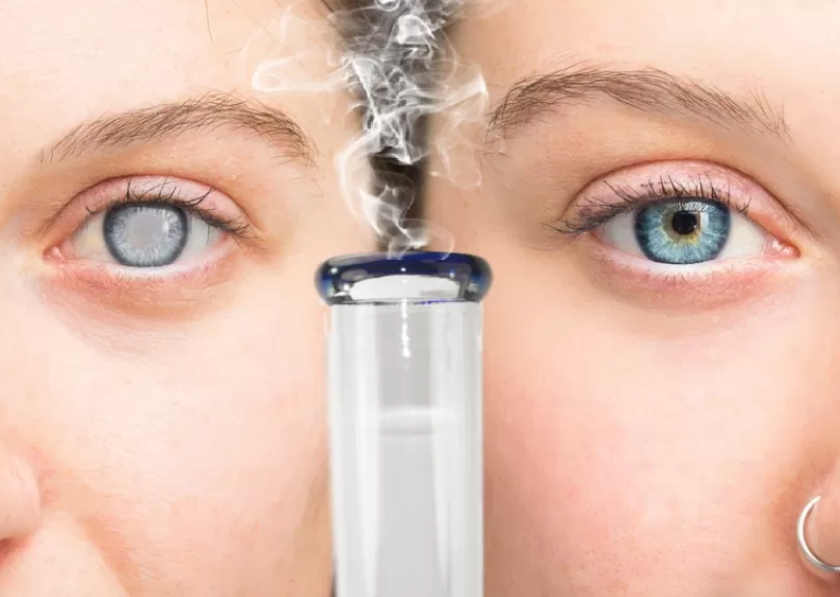Healthcare
Does Cannabis Work for Glaucoma? – What the Lastest Studies Say!

Does medical marijuana help with glaucoma?
Cannabis for Glaucoma – An Ongoing Debate In The Medical Community
Glaucoma is a name used to refer to conditions affecting the eye, specifically the optic nerve which we rely on heavily for good vision.
Glaucoma is usually associated with a gradual increase of pressure in the eye, called intraocular pressure. When intraocular pressure damages the optic nerve, this can lead to vision loss and even permanent blindness within the span of a few years if it isn’t treated. It can be tricky to diagnose it because during the early stages of glaucoma, many people don’t experience any pain or symptoms. The best way to diagnose it early to prevent loss of vision is to have regular checkups with your eye doctor.
Once you have glaucoma, you will likely need lifelong treatment. However, with early diagnosis, vision loss can be slowed down and permanent blindness can still be prevented.
Currently, treatment methods for glaucoma include prescription eyedrops which are designed to reduce eye pressure and improving fluid drainage from the eye. If intraocular pressure is severe, more than one type of eyedrop may be recommended. In addition, depending on how severe the glaucoma is, some patients may be prescribed oral medications and eye surgery on top of lifestyle changes.
However, cannabis has been shown to be promising in the treatment of glaucoma.
What The Latest Studies Say
At the moment, the medical community is still divided when it comes to the benefits of cannabis for glaucoma. Some agree that it does work because of the evidence, while others are still on the fence.
The studies backing up how cannabis can naturally reduce intraocular pressure dates back as far as 1971. In this study, 11 healthy participants were asked to go through eye exams before and after smoking 2 grams of marijuana. Researchers discovered that the changes observed varied from 4% increase to as much as 45% decrease in intraocular pressure. Further studies showed that some 65% of glaucoma patients experienced 30% pressure decrease after inhaling cannabis, and its positive effects lasted 3-4 hours. It should also be noted that the benefits of cannabis for glaucoma were dose-dependent.
According to Dr. Nick Andrew, a specialist eye surgeon, THC is the primary cannabinoid that works to reduce intraocular pressure by reducing the fluid that fills up the eye. He adds that THC eyedrops are recommended as the ideal administration route since the THC compounds only need to reach the eye, without having to pass through the nervous system.
Furthermore, the American Association of Ophthalmology says that since the effects last 3-4 hours, they don’t advise using cannabis to treat glaucoma for people who need to be sober in order to drive, operate heavy machinery, or go to work.
But this hasn’t stop people and dispensaries from recommending it. A 2020 study that was published in Ophthalmology Glaucoma journal revealed that 51% of dispensaries surveyed recommended marijuana use while others said they were either unsure or deferred recommendations. Additionally, they also found that 2.6% of glaucoma patients admitted to using cannabis. These figures show that even though many cannabis advocates are working hard to prove the benefits of the plant for glaucoma, many Americans are still not receiving the information and care that they need for a condition that’s difficult to treat.
“Few glaucoma specialists have recommended marijuana as a treatment for glaucoma and an even smaller percentage of patients report its use as a treatment for glaucoma,” wrote the authors. “In contrast, many dispensary employees endorse its use. As legal access and public acceptance of marijuana escalates, physicians should be aware of these perceptions when educating patients,” the authors concluded.
According to Dr. Bret A. Hughes, MD, many glaucoma patients are seeking alternative treatments for glaucoma. He explains how it works in the human body for treating this eye condition: “Humans have an endocannabinoid system with receptors that are stimulated by THC and CBD. The body also has naturally occurring cannabinoid receptor ligands, i.e., arachydonoylethanolamine and 2 arachydonoylglycerol, which mimic the effects of THC and CBD in the body.”
“Natural and synthetic cannabinoids interact with the endocannabinoid system to produce aqueous production, increase outflow, and provide neuroprotection,” he explained.
It’s also interesting to note that while cannabidiol (CBD), another powerful anti-inflammatory compound in cannabis that doesn’t get you high, has been used widely for treating many life-threatening conditions, this cannabinoid is not recommended for treating glaucoma. An animal study in 2019 found that CBD and THC has varying effects on eye pressure; while THC was beneficial in reducing eye pressure by as much as 30%, CBD could actually increase eye pressure, which is not good news for glaucoma patients.
Conclusion
Many patients around the country already use cannabis as part of their glaucoma treatments. If your glaucoma is still in its mild stages, cannabis can be of great help though it’s not meant to substitute all medication and treatment entirely.
Cannabinoids have shown potential in reducing the intraocular pressure associated with glaucoma. They also have neuroprotective properties, and we anticipate the development of THC eye drops that will greatly benefit glaucoma patients. There is still ongoing research to see how this can be executed because it’s a challenge considering the eye’s surface may not be able to absorb the cannabinoid eye drops. Water and oil-based eye drops didn’t work based on previous research, so scientists are further investigating which methods of administration will be more feasible in the future.